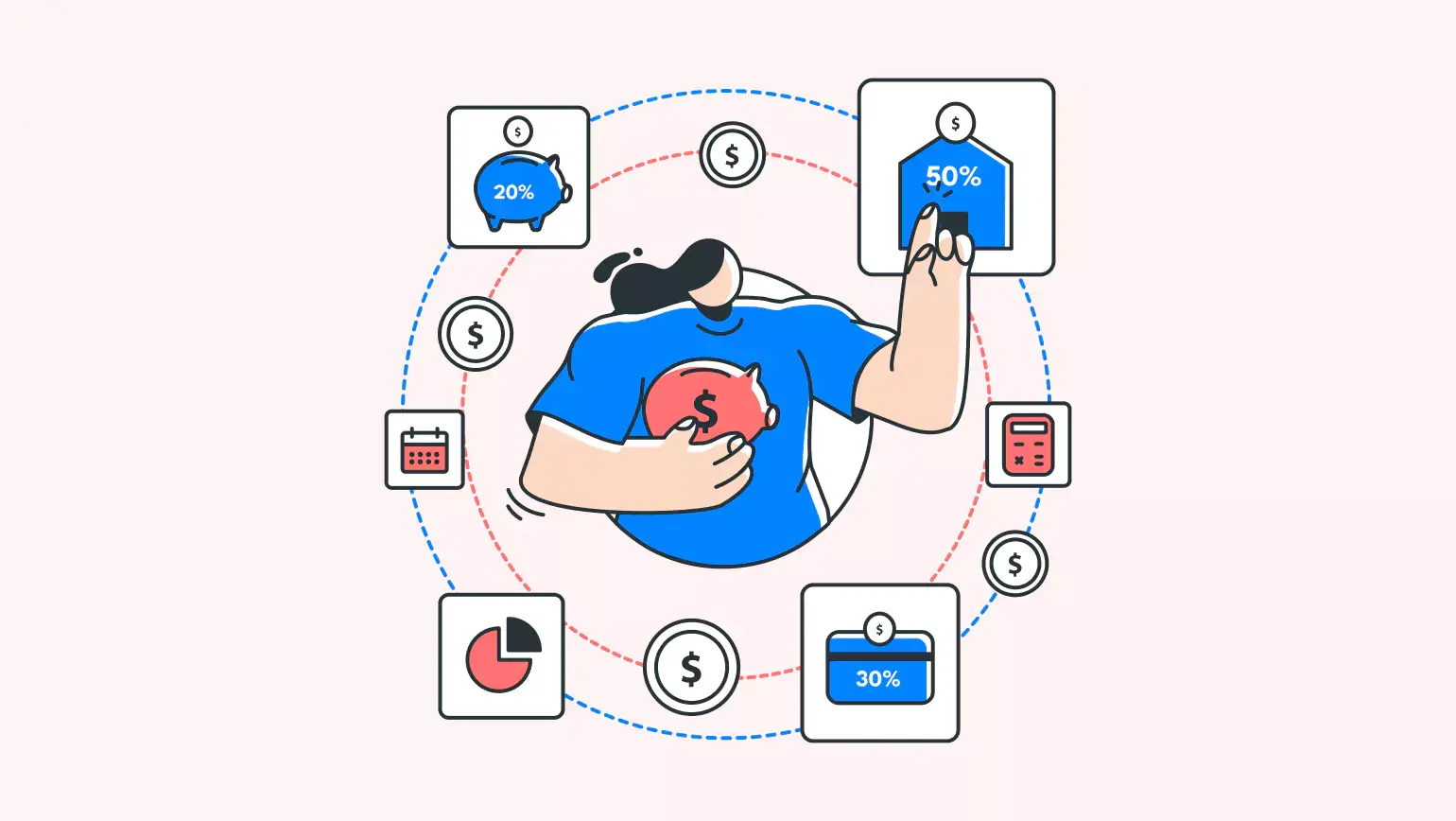

Payroll processing is a vital yet complex task that requires financial professionalism and experts. It’s not just about determining an employee’s salary and paying them that amount each month.
Instead, it’s a very comprehensive process, which includes collecting employee information, tracking hours worked, calculating gross pay and employee benefits contribution, deducting taxes and other statutory deductions (like PFs), and, of course, distributing payments.
Not all businesses have the time or the resources to manage all these payroll tasks efficiently. And even if they do, even one small mistake can result in legal fines and penalties. In fact, one in three companies gets penalized due to payroll mistakes.
This is why 53% of businesses outsource their payroll services to third-party agencies and companies to simplify their processes and avoid critical errors and mistakes.
Let’s take a closer look at what payroll services are, their benefits, and what factors to look for when looking for a payroll service provider for your company.
Understanding the Meaning of a Payroll Service
A payroll service is offered by third-party companies or agencies that assist companies with their payroll and employee payments.
This service is highly beneficial for organizations that don’t have the expertise and knowledge to handle payroll in-house.
In addition, payroll services are especially crucial when dealing with international employees, freelancers, or contractors who work remotely to ensure accurate wage and tax deductions.
In fact, 75% of organizations that implemented a global payroll solution saw a significant reduction in payroll errors, and 68% improved their legal and compliance regulations.
Let’s understand more about how these payroll services work.
How do Payroll Services Work?
While some companies require payroll services to simply manage employee’s payroll, others opt for more comprehensive and full-package payroll services that handles the entire process end to end.
Here is a detailed breakdown of how payroll services generally work and what they do.
- Gathering data, including tracking employee’s working hours from the time-tracking software and determining employees eligible for bonuses and extra commissions.
- Wage and deductions calculations: Based on the gathered data, payroll services calculate employees’ total earnings by also calculating and considering payroll deductions, such as federal, local, and state laws, benefits deductions, and social security and medicare distributions to determine employees’ pay.
- Withhold and pay payroll taxes: To ensure accuracy, payroll services verify employees’ tax withholding and calculate the employer’s share of taxes, including unemployment taxes and FLCA.
- Payment distribution: Once the final calculation is done, payroll service providers pay employees’ paychecks via direct deposit or other preferred payment options and also provide payslips where employees can check their total earnings, deductions, and payment history.
- Payroll tax filing: Payroll services handle tax filing with relevant government authorities. This process includes filing annual and quarterly tax forms, paying liabilities, and ensuring compliance with wage and tax laws.
- Year-end reporting: At the end of the year. Payroll service providers prepare and submit W-2 forms and tax summaries for employees to simplify the tax reporting process.
Benefits of Payroll Services
Payroll outsourcing is predicted to grow at a 7.45% CAGR between 2023 and 2033. Managing payroll is a complex and time-consuming task for several businesses.
Hence, outsourcing payroll services takes a huge burden off businesses, allowing them to focus on their growth. Here are a few benefits of payroll services for businesses:
-
Enhanced accuracy
Payroll management and processing involve complex calculations, which, when handled manually and with less expertise, can result in errors like overpayment, underpayment, or non-compliance with taxes.
49% of U.S. workers consider opting for a new job opportunity after two payroll errors by their existing company. At the same time, businesses that use payroll software see 31% fewer errors in the payroll system.
Hence, by leveraging automated or automatic payroll processing, payroll service providers reduce the chances of errors, ensuring high accuracy and satisfied employees.
-
Accurate tax information
Dealing with payroll taxes is one of the biggest pain points for businesses.
Payroll services simplify taxes for businesses by automating tax calculations, deductions and filing payroll taxes at federal and local levels for businesses, reducing risks of penalties and ensuring the deadlines for tax payments are met.
Moreover, payroll services stay up-to-date with the changes in tax laws and regulations, ensuring correct tax law application and avoiding miscalculations with tax withholding and errors.
-
Compliance with laws and regulations
Labor and tax laws are constantly changing, making it imperative for businesses to track these changes to stay compliant with the latest tax regulations.
Payroll services handle local, state, and federal laws and tax withholdings and file the payroll tax forms, including W-2, 941, and 1099, to ensure businesses meet regulatory requirements.
Besides handling taxes, payroll services also help organizations and businesses comply with labor laws, including overtime pay regulations, minimum wage requirements, and employee classification (full-time, contractor, or part-time), minimizing risks of legal audits or disputes.
-
Data security
Payroll management includes handling sensitive employee information, such as bank account details, addresses, social security numbers, etc.
Payroll service providers implement advanced security measures, such as using high-end encryption methods to prevent unauthorized access and meet compliance regulations surrounding data security standards.
-
Cost savings
Businesses see a reduction of 80% in payroll processing costs by automating payroll processes.
While payroll services do come with their associated fees, they ensure overall payroll costs for businesses by minimizing manual errors, manual labor, and risks of tax penalties and labor laws.
What are the Different Types of Payroll Services?
Payroll services are categorized into several types, depending on the payroll system, entity handling them, business size, complexity, and specific payroll needs.
Here are the different types of payroll services:
- Full-service payroll providers offer comprehensive and extensive payroll services, from handling employee payments and tax withholdings to filing tax and statutory reports.
- Payroll Software-as-a-Service (SaaS) is a flexible cloud-based platform that offers self-managed payroll services that automate tax and payment calculations. It’s ideal for small—to medium-sized businesses.
- Professional Employer Organizations (PEOs) not only offer payroll services but also support a full suite of HR services. Thus, they work in a co-employment model offering full-suite HR support, which is beneficial for small—to mid-sized businesses.
- Payroll aggregators gather and standardize payroll information across different regions for companies across multiple locations and countries.
- Payroll Business Processing Outsourcing (BPO) handles only certain aspects of payroll processing, like either appropriate taxes or payments, depending on the business needs and service agreement.
How Do You Choose The Right Payroll Service Provider?
Selecting the right payroll outsourcing provider involves strategic decision-making that considers factors like budget, business size, and more. Let’s elaborate and look at some more factors you need to consider when choosing the right payroll service provider:
-
Assess current business needs and payroll challenges
The first step to choosing the right payroll provider is assessing current business needs and conducting a thorough self-assessment of your specific payroll requirements.
It’s important to assess factors like the number of employees, compliance requirements, challenges with existing payroll systems, and specific HR requirements to choose a payroll system that best meets your needs.
-
Business size and complexity
A business’s size and complexity often dictate the type of payroll system required for efficient functioning.
For instance, a small or medium-sized business may benefit from cloud-based and payroll SaaS solutions, which are affordable and easy to manage and handle basic payroll services, like wage calculations.
However, larger businesses with a huge employee count and complex pay structures require comprehensive payroll solutions, such as PEOs or full-service payroll providers offering advanced features like benefits administration.
-
Tax and compliance needs
Businesses operating across multiple regions and industries need to comply with region-specific compliance regulations.
For these businesses, choosing a payroll provider with expertise in international and multi-regional compliance is essential to prevent legal penalties.
PEOs and managed payroll services provide industry-tailored compliance solutions that handle nuanced payroll compliance requirements and avoid tax-related penalties.
-
Integration capabilities
Businesses need to integrate payroll systems with other systems and software, such as HR, accounting, and time-tracking, to facilitate business operations.
For instance, integration with accounting systems enables payroll data to be automatically reflected in financial reports and statements, simplifying financial tracking.
So, make sure you choose a payroll service that offers the necessary integration capabilities you need for your business.
-
Customer support
Responsive customer support is critical, especially in case of unexpected payroll issues.
It’s important to research and review companies' reputations and check case studies to assess the service provider’s reputation and credibility. Choose a provider that offers 24/7 customer support and helps businesses with complex payroll administrative tasks and challenges whenever needed.
-
Scalability
Choosing a scalable payroll provider that helps businesses grow and save time and money is crucial for business success.
A payroll service should easily handle payroll for growing employees and handle fluctuations in the workforce without compromising accuracy and efficiency.
Conclusion
Payroll services make managing payroll and associated HR tasks a breeze. They streamline everything from tax calculation to payment processing, reducing risks of errors and legal penalties and saving businesses time and money.
Depending on your business needs, choosing the right and most reliable payroll service is crucial. At Darwinbox HR, we offer payroll services, which offer a 4-step process for your payroll system, making it easy and accurate.
Our system offers a seamless user experience and simplifies payroll management for businesses of all sizes and regions.
Schedule a demo today to learn more.
FAQs
How much does a payroll service cost?
The average cost of a payroll service depends on the business’s size, customized requirements, and the services included. Depending on the specific business requirements, the company can choose the right payroll service package either on a monthly or per-employee processing fee basis.
What is the difference between payroll service and payroll software?
A payroll service allows you to outsource your business’s payroll functions, including wage calculations and deducting taxes, allowing you to focus on other administrative work. It often includes dedicated support and free time for the HR department.
On the other hand, payroll software is a tool that businesses use internally to manage and automate payroll tasks. It requires expertise in payroll processing but offers more control over the entire process.
When is the right time to change your payroll service provider?
It’s generally recommended that you consider switching or changing your payroll service provider if you’re facing issues such as poor customer service, high fees, compliance concerns, a poor user interface, or limited features.
Moreover, if your business is growing rapidly or considering expanding and onboarding employees from international borders, choosing a scalable and comprehensive payroll service provider that meets your specific industry demands is crucial, especially when your current payroll service lacks these features.


Speak Your Mind